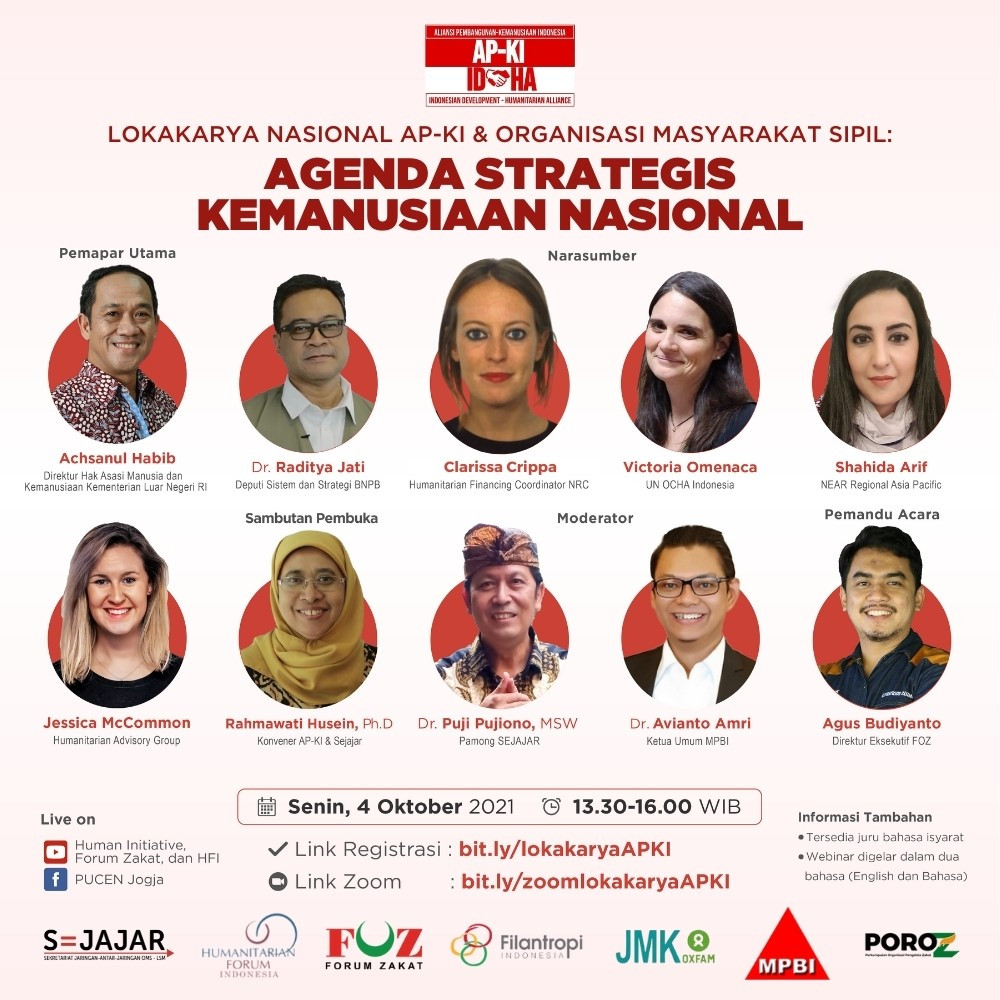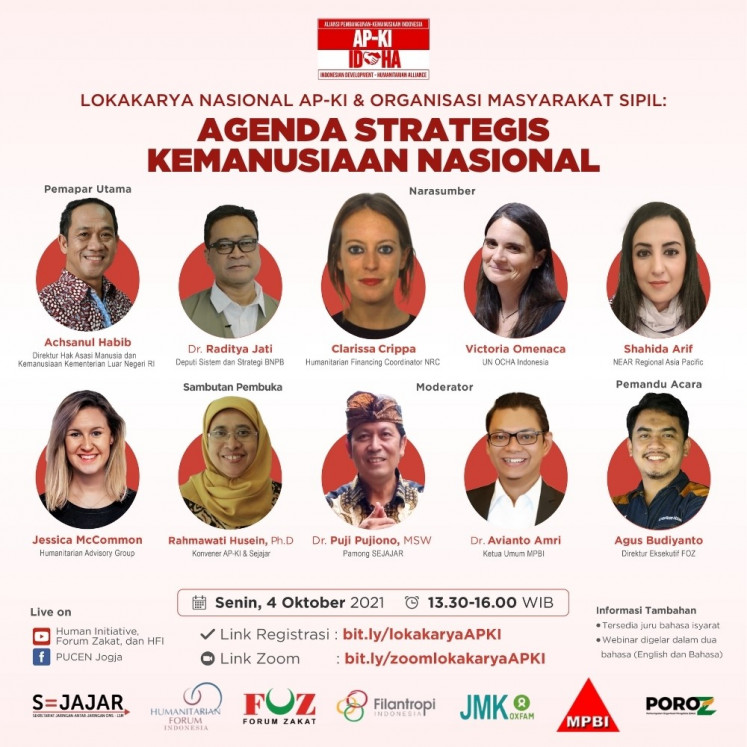Popular Reads
Top Results
Can't find what you're looking for?
View all search resultsPopular Reads
Top Results
Can't find what you're looking for?
View all search resultsIndonesia struggles to promote equality in humanitarian works
Change text size
Gift Premium Articles
to Anyone
I
ndonesia urgently needs to have a humanitarian house, part of continuous efforts to promote equality in humanitarian works to follow up a document known as the agreement of the century, or the Grand Bargain (GB).
The issue was part of an event called “Activity framework national workshop of Indonesian Development-Humanitarian Alliance (AP-KI) and Community Social Organization: Grand Bargain 2.0 and the National Humanitarian Strategic Agenda” held virtually on Oct. 4.
The humanitarian house will serve as an instrument for capacity-building for humanitarian actors so as to enable humanitarian works to run effectively.
The concern was addressed in response to the imbalanced capacity of humanitarian activists, unequal partnerships, support for local humanitarian capabilities or actors and more intensive coordination highlighted in the GB, agreed during the World Humanitarian Summit held in Istanbul, Turkey in 2016.
The agreement focused on the pattern of relations between observers, activists and important policymakers in the humanitarian world.
According to a spokesperson for the Focused Group Discussion (FGD) at the workshop, the humanitarian architecture under the humanitarian framework should be “authentically Indonesian”, adopting local values but at the same time conforming to humanitarian works at the global level.
“House of humanitarian works is a living document that will be continually adjusted to the context in the era in which the concept is to be implemented,” the spokesman said.
The initiative to build a humanitarian house, along with other proposed solutions discussed in the FGD will serve as discussion materials, which will be followed up in the upcoming meeting.
AP-KI initiated the national workshop to determine the position of Indonesian civil society and design follow-up steps in the Grand Bargain 2.0, a new framework prepared in 2021, five years upon the GB agreement.
The speakers at the workshop included Head Office of UN OCHA Indonesia Victoria Omeneca, NEAR Regional Asia Pacific Shahida Arif and Clarissa Crippa as Humanitarian Financing Coordinator of NRC was on the part GB 2.0 behalf as well.
This discussion was informed by key findings of the Building a Blueprint for Change research, which has been conducted in Indonesia by Pujiono Centre and Humanitarian Advisory Group over the past two years.
This research has sought to connect global priorities in the Grand Bargain to the local context in Indonesia to propose country-specific priorities for humanitarian reform.
Findings of the research align with the Grand Bargain 2.0’s increased focus on support and funding for local actors, but take this one step further to propose specific entry points and conditions for this new framework to be successful in Indonesia.
. (Courtesy of Human Initiative/.)The workshop provided an overview of key findings followed by more detailed discussion of how this research could be used as a platform to advocate for meaningful change in Indonesia.
The workshop was divided into two segments: Humanitarian Overview moderated by Avianto Amri the Chairman of MPBI and parallel discussion on the Humanitarian Agenda in Indonesia moderated by Puji Pujiono of SEJAJAR.
The event also addressed six different issues: Coordination, Pooled Fund, Humanitarian Framework, Vaccination, Accountability Framework and Capacity.
Meanwhile, referring to Grand Bargain 2.0, Rahmawati Husein of SEJAJAR & HFI, said in her opening remarks, “We had some points regarding capacity of humanitarian activists that are imbalanced.”
“Therefore, we need equal partnership and also capacity support, especially for the local humanitarian actors, because in the end, the local level is in charge,” she said.
“We had experience during the pandemic with mobilization and international organizations finding it difficult to penetrate to the local workers who play a central role in tackling the pandemic. They can either be government or non-government organizations,” she said.
Referring to data at the Meteorology, Climatology and Geophysics Agency (BMKG), she said that more than 500 local organizations were involved in humanitarian works in Indonesia. “It is important to reinforce the capacity of the local organizations to survive and to keep contributing to the management of humanitarian works in Indonesia,” she noted.
She highlighted the importance of funding as far as management works in Indonesia are concerned.
“Funding is the key either for local organizations to conduct humanitarian works but also at the same time to make humanitarian works effective,” she said.
“The government, local organizations or civil society are the key to how humanitarian works can become effective and so, the governance is highly crucial,” she said.
According to her, regulation-wise the government plays an important role in reinforcing the local capacity, which will drive all local humanitarian works to be bigger, stronger and more effective.
Collaborative works should not only be realized at a normative level, but should also really spur the reinforcement of NGOs that so far have been involved and made significant contributions, she said.
Improving local capacity could pave the way for better local humanitarian works, would reduce dependency on external funds and “also we have bigger appreciations and concerns.”
Director for human rights and humanitarian affairs at the Ministry of Foreign Affair, Achsanul Habib, highlighted the importance of dialogs and discussion on observing the content of the GB. I really appreciate IDHA dialog,” he said.
Despite some restraints in the GB, it is hope that developed and developing countries can adapt to it.
“That’s why we think the tailored-made approach will become an important element in observing the implementation of the GB,” he said.
According to him, the discussion of the GB 2.0 should be based on the experience of humanitarian works in Indonesia. “We have no doubt about the experience and expertise that Indonesian people have in the Grand Bargain and that’s why they [the experience and expertise] will become the main tool for the Grand Bargain 2.0, whether all elements of the Grand Bargain can be aligned, conditional, impartial, neutral and voluntary or can really answer humanitarian works in Indonesia,” he said.
According to him, humanitarian value “is the DNA in our lives as Indonesians. We hope the discussion can reflect and strengthen the humanitarian values that have embedded in Indonesian people,” he said.
He expressed hope that there would be local equality assistance for the humanitarian process at the international level “as we need more efforts to monitor the context of the GB before this can be internalized for the humanitarian works.”
Meanwhile, Raditya Jati as Deputy System and strategy on National Disaster Management Agency (BNPB) underscored the importance of humanitarian planning, which he called “adjusting humanitarian efforts” given that a talk on humanitarian planning in Indonesia was not only related to natural disasters but also pre-disaster response, rehabilitation and construction, a disaster cycle.
According to Raditya, humanitarian concern is not a new issue. “The issue is included in our state ideology Pancasila. So, humanitarian works are based on our social foundation,” he said.
He shared Rachmawati’s view that Indonesia has the capital as a social people and so “we have the strength. We are probably different from other countries but I am confident that Indonesia is ready because we have strong social capital and are willing to collaborate with different parties, including the government, business, activists, academics and everyone. Everyone plays a role in achieving a shared goal,” he said.
He said this positive trend was a strong organization and it was important to know how to respond to disasters and that had actually been mandated by the President as the leader in policymaking.
He said Indonesia was an archipelagic state, meaning the country is highly vulnerable to natural disasters due to the dynamics of geological processes. “Indonesia is always close to disaster and the question now is to what extent are we ready to face all of this?”
The BNPB framework itself set out in the national developing planning draft 2020-2024 aims to reduce casualties as well as the impacts on society and infrastructure. “In relation to the GB, the important thing is how the GB will be carried out on the ground and how far Indonesia is committed to addressing humanitarian issues,” he said.
The concerns include the inclusiveness related to vulnerable groups, disabled people and a regulation regarding gender, according to Raditya.











